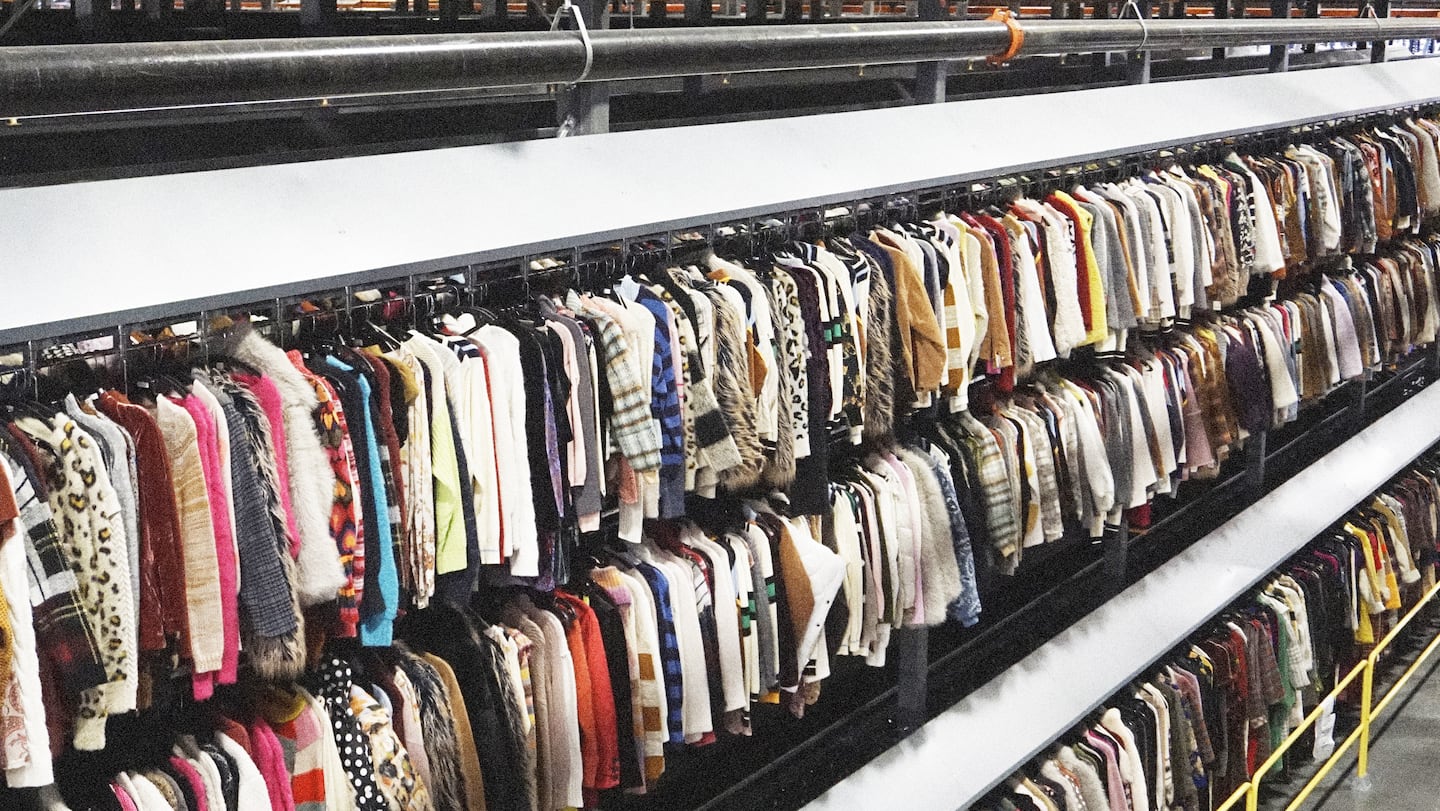
Agenda-setting intelligence, analysis and advice for the global fashion community.

Agenda-setting intelligence, analysis and advice for the global fashion community.

Becky Stern used to be a Rent the Runway fanatic.
An early member of the service’s “unlimited” subscription, she paid $159 a month for an endless stream of new jackets and handbags. She would often try items on at the company’s Flatiron storefront.
“It was the best kept secret in New York,” said Stern, 31, a political consultant.
Then the pandemic hit. As the need for work blazers and party dresses disappeared, Stern reluctantly put her membership on hold. When she was ready to come back, in 2021, she said Rent the Runway felt like a different company: the unlimited plan was gone, replaced by four tiers of membership; the closest she could find to her old “endless closet” plan cost $193. The Flatiron shop had closed.
ADVERTISEMENT
Stern is now a loyal subscriber to Nuuly, a rental service launched by Urban Outfitters Inc. in 2019, which she says better serves her post-pandemic need for more casual clothing.
She’s not the only rental customer to make the switch.
Though Rent the Runway had a nearly 10-year head start, Nuuly has vaulted past its competitor by some measures. In October, Nuuly had over 190,000 subscribers, compared to Rent the Runway’s 141,000 average active users in the second quarter, its most recent earnings report. Rent the Runway still generates more revenue, with second-quarter sales of $75.7 million, compared with $55.8 million for Nuuly in a similar period.
Urban Outfitters Inc., which has spent at least $100 million on Nuuly, has made a so-far successful bet that an affordable, more laid back rental option will bring in younger, less-affluent customers who might not have previously considered the concept. It offers a single membership option: $98 for six items per month (Rent the Runway recently raised the number of rental spots for a similarly priced tier from four to five). Its inventory is heavy on mix-and-match separates, often from Urban-owned labels like Free People and Anthropologie. There’s no shortage of dressier options too, as well as offerings from contemporary brands like Lisa Says Gah and LoveShackFancy, some of which also appear on Rent the Runway’s platform.
That formula has proved a better fit for the post-pandemic way of dressing. Pre-Covid, rental services pitched themselves as a way for consumers to stock their closets with more premium, occasion wear-heavy assortments.
Rent the Runway, which virtually created the rental category when it launched nearly 15 years ago, is adapting to the new consumer mindset, and its new competition. It says more than half of the pieces it rented last year were in the “casual/weekend” category, and added an extra item to each of its membership tiers at no additional charge. Its subscriber base is also growing, but not fast enough for investors: its stock price is down 98 percent since its 2021 initial public offering, trading Tuesday at just 52 cents a share.
The market’s pessimistic outlook for Rent the Runway reflects another key difference between the two companies: Nuuly has the backing of a big corporate parent, which means it doesn’t need to operate in the black as it figures out rental, though it says it’s on track to have a profitable quarter by the end of the year. (Rent the Runway says it will be “free cash flow breakeven before cash interest expense” sometime in 2024.)
Urban Outfitters isn’t shy about its ambitions to dominate the category, either.
ADVERTISEMENT
“We think the Nuuly business could be our next billion-dollar brand,” said Dave Hayne, Urban Outfitters Inc.’s chief technology officer and Nuuly’s primary architect. “We feel like we’re still growing a relatively young market.”
Hayne said Nuuly’s growth doesn’t have to come at the expense of its competitors, noting that more than half of new subscribers are also new to rental.
The straightforward membership package helps: that extra sixth item each month means “more bang for your buck,” said Patty Diez, 32, a Nuuly subscriber for over a year and a half, and former Rent the Runway customer.
Users say Nuuly also offers a deep inventory from which they can always find something new and covetable to rent; a common point of frustration among Rent the Runway customers is that new drops are almost always immediately rented out.
Los Angeles-based Pistola Denim is an independent brand that has had a two-year wholesale relationship with Nuuly and started working with Rent the Runway too earlier this year. On average, Nuuly will purchase 600 units per Pistola style, according to founder and creative director Grace Na, whereas Rent the Runway has purchased 300 units, though the brand is still relatively new on the latter’s roster.
“Nuuly has the openness and flexibility to buy,” said Na. “They’re very aggressive when it comes to reacting to what’s working.”
Chelsea Hansford, creative director and CEO of Simon Miller, another womenswear brand with wholesale relationships with both Nuuly and Rent the Runway, said Nuuly’s buys are marginally bigger, but the main difference is that Nuuly has often reordered popular Simon Miller styles.
“From my experience, Rent the Runway was often sold out in my size or the largest size wouldn’t fit,” said Allie Pringle, 31, another Nuuly user. Nuuly, on the other hand, offers sizing beyond XL or XXL, she added. “Nuuly’s assortment of plus size items has been a standout to me — and what they offer is cute. So many times, plus-size pieces aren’t the cutest or trendiest stuff.”
ADVERTISEMENT
In a statement to BoF, Rent the Runway said it has taken steps to significantly increase the depth of its offerings, including in-season replenishment buys for the most sought-after styles. In the second half of 2023, its new buys will be nearly double — or 1.7 times — that of the first half of the year.
As a disruptive new retail concept, rental never had a shortage of deep-pocketed champions; Rent the Runway raised $415 million in funding before its IPO in 2021.
Nuuly, too, required significant capital expenditure to get to where it is today, including fulfilment centres and dry cleaning facilities. But Nuuly was able to draw from Urban’s “core strengths,” Hayne said, from the finance and legal departments to tech and HR.
“Because of that infrastructure, Nuuly had a leg up on the business,” said Janet Kloppenburg, retail analyst at JJK Research.
Urban Outfitters’ approach is rare in the fashion industry, where most brands that offer rental do so through a third-party provider, such as CaaStle, which operates the entire service. That limits the risk, but also the upside; brands such as Vince and Maje have offered rental for years through CaaStle, a sign their customers want the service. But they aren’t talking about building billion-dollar brands, either.
It was a big gamble for Urban Outfitters — but one that seems to be paying off.
“One of the big things that helped Nuuly be successful is we made a very concerted approach from the outset,” said Hayne. “We didn’t approach this as a side project for a small team that’s splitting their time. It was a very concerted effort to build a big business.”
Rental remains a difficult market to crack, with heavy turnover rates because the novelty of choosing and receiving clothes every month wears off over time.
“You wear it, you send it back, and maybe it gets annoying at a certain point,” said Kloppenburg. “Rental fatigue is probably the business’ biggest risk.”
For that, Nuuly and many of its rental counterparts offer an easy “pause” option, which allows active subscribers to take a hiatus from renting. On average, about half of Nuuly customers are still subscribed after 12 months. After two years, that figure falls to the 40 percent range, according to Hayne. According to Rent the Runway, over a third of its 2022 revenue was generated by subscriptions that were over 5 years old.
But the promise that keeps drawing investors and brands to the category is that once a conventional shopper becomes a renter, it’s hard to imagine going back to only purchasing fashion.
The category’s top players are sorting themselves into niches: Nuuly for fun everyday attire; Rent the Runway for occasions and premium brands; Vivrelle for designer handbags. There are also one-off rental options such as Pickle and By Rotation. Pickle, in fact, recently picked up $8 million in venture capital fundraising.
“Right now, I’m doing sweaters, pants and jackets with Nuuly,” said Stern. “But who knows, maybe when the wedding circuit comes back next year, I might evaluate getting on Rent the Runway again too.”
After years of trial and error, rental platforms have found new ways to improve margins and acquire customers, such as focussing on niche categories. Profitability remains elusive, however.
The rental platform’s revenue is up from last year — with the number of active subscribers more than doubling — but figures still remain below pre-pandemic levels.
The recent shuttering of rental start-up Seasons highlights how logistics costs and uncertain cash flow have dimmed the prospects of a once-hot retail concept.

Cathaleen Chen is Retail Editor at The Business of Fashion. She is based in New York and drives BoF’s coverage of the retail and direct-to-consumer sectors.
The dream of creating an American answer to LVMH and Kering faced a major setback this week after a federal judge championed the Federal Trade Commission’s narrow definition of the sub-luxury handbag market.
The high-profile matchup between the New York Yankees and Los Angeles Dodgers has brands from both cities finding creative ways to take advantage, with or without an official MLB licence.
The British handbag maker will lay off around 85 people globally as it aims to chart a path back to profitability after fending off a takeover bid from billionaire Mike Ashley’s Frasers Group.
Businesses are responding to customer fatigue with price increases by shifting focus to more affordable products, reflecting a broader trend that may help curb inflation and support continued Federal Reserve interest rate cuts.